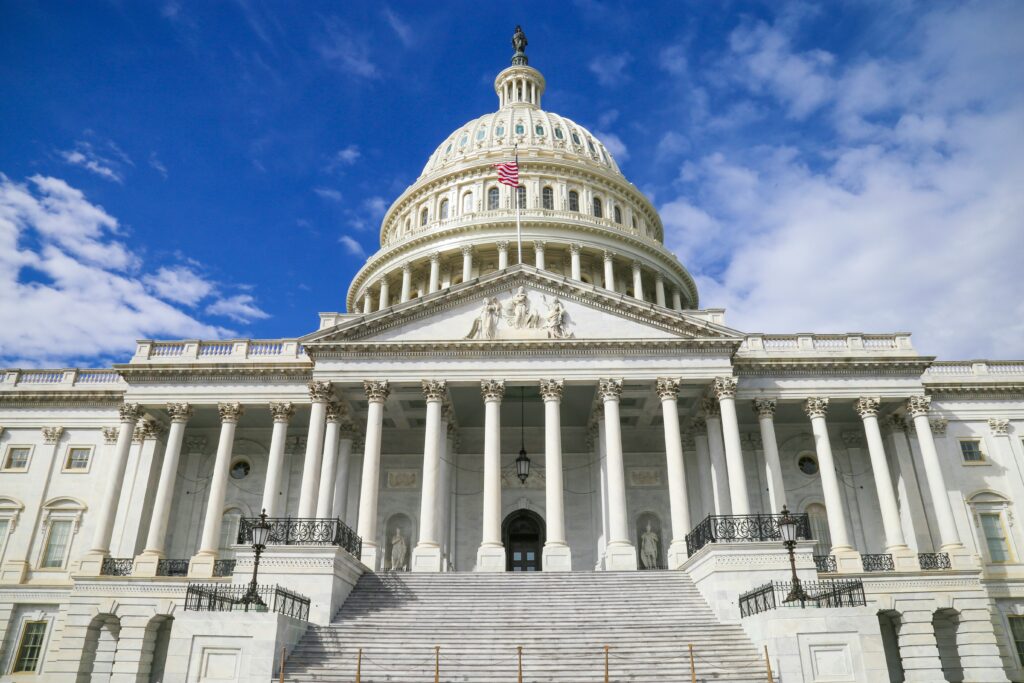UPDATE: Since publishing, a new bill was drafted by Congress and passed. A shutdown was narrowly avoided. The passing bill resembles the original draft more closely than the second draft. Still, the close call signals potential hardships for the Trump Admin and the thin margin of Republican control in Congress.
A government shutdown appears increasingly likely as Republican leaders in the House face mounting pressure from within their party and outside forces to reject a bipartisan spending bill that would fund the government through March 14. Former President Donald Trump and allies, including billionaire Elon Musk, have rallied opposition to the measure, intensifying a crisis with just days before funding expires.
Speaker Mike Johnson’s proposal to pass a continuing resolution (CR) to extend government funding has faced widespread criticism for including unrelated policy measures and billions in disaster and agricultural aid. This includes billions in aid for hurricane victims in states such as North Carolina. The bill’s fate grew dim after Trump issued a sharp statement Wednesday, calling on Republicans to oppose what he described as “Democrat giveaways.” Trump advocated for a streamlined CR paired with a debt ceiling increase.
Should the government shut down, millions of Federal employees will go without pay. This includes 1.3 million active-duty service members would be without a paycheck. Additionally, border agents, prison workers, Homeland Security workers and dozens of other departments would be without pay. Those in Congress voting on the bill? Their pay isn’t affected.
In New Jersey alone, 22,000 civilians will be affected. Many of these Federal employees will still have to work without pay.
Elon Musk Gets His Money’s Worth
“Any member of the House or Senate who votes for this outrageous spending bill deserves to be voted out in two years,” Musk posted on X, his social media platform, in a series of attacks on the proposal. Musk, alongside tech entrepreneur Vivek Ramaswamy, has pushed for sweeping federal spending cuts, amplifying discontent among ultraconservatives and mainstream Republicans alike.
Speaker Johnson, appearing on “Fox and Friends,” defended the bill, saying it was a necessary step to “clear the decks” for Trump’s forthcoming administration. However, his reassurances failed to quell dissent within GOP ranks, with figures like Rep. Ralph Norman (R-S.C.) calling the measure a “monstrosity” and accusing it of betraying voters’ demands for fiscal restraint.
Not On Trump’s Watch
Adding to the turmoil, Trump and his allies have demanded that Republicans address the looming debt ceiling in the current funding package. Trump argued that raising the borrowing limit under President Biden’s tenure would spare his incoming administration from political fallout. The U.S. is expected to hit the debt ceiling in January, risking a default unless Congress acts.
“Increasing the debt ceiling is not great,” Trump said, “but we’d rather do it on Biden’s watch.”
The backlash has left Johnson with few options. Some Republicans have suggested stripping the bill to include only the spending extension and attempting to pass it with Democratic support. Yet, the bill’s broad opposition makes even that path uncertain. Democrats, frustrated by the collapse of earlier negotiations, have signaled little willingness to intervene. In a social media post, House Democratic Leader Hakeem Jeffries said of GOP requests for cooperation, “GOP extremists want House Democrats to raise the debt ceiling so that House Republicans can lower the amount of your Social Security check. Hard pass.”
The impasse underscores deep divisions within the Republican Party as it prepares to take full control of Congress next year. It also highlights the influence of figures in Trump’s orbit, such as Musk, who have demonstrated the power to mobilize opposition to legislative compromises. Everyday people, AKA US citizens, are left wondering how an unelected figure could wield so much power over our lives.
Unless a funding solution is reached, the government will shut down at midnight Friday, forcing hundreds of thousands of federal workers into furlough or unpaid labor. National parks and museums would close, and critical services could be disrupted.
As the deadline nears, the Republican leadership faces a daunting challenge: balancing the demands of hardline conservatives and Trump’s allies while navigating a deeply polarized Congress. For now, the path forward remains unclear.
The New Jersey Digest is a new jersey magazine that has chronicled daily life in the Garden State for over 10 years.
- Staffhttps://thedigestonline.com/author/thedigeststaff/
- Staffhttps://thedigestonline.com/author/thedigeststaff/
- Staffhttps://thedigestonline.com/author/thedigeststaff/
- Staffhttps://thedigestonline.com/author/thedigeststaff/


